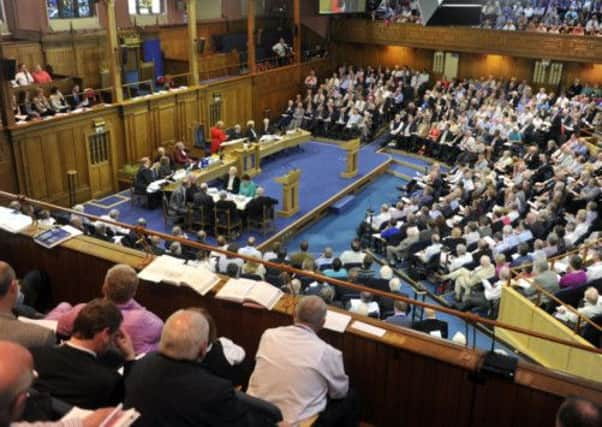Leaders: Kirk’s gay ministers ruling | Drink proposals


Those convictions also instruct the faithful as to how they should conduct their daily lives and inform the collective life of religious institutions, norms which become equally imperturbable.
To change those norms, because they derive from belief in the teaching of God which, by definition, must be immutable and ever-lasting, is therefore extremely difficult for the faithful to the point of causing real mental anguish and pain. That was very obvious from the contributions to yesterday’s debate at the General Assembly of the Church of Scotland on the ordination of gay ministers.
Advertisement
Hide AdAdvertisement
Hide AdThe outcome, from the point of view of the non-religious and non-heterosexual activists, is eminently criticisable as a fudge, hedged by get-out clauses and obscured in a procedural maze. But to join in that criticism would be an act of intolerance that ignores the right of people to have their lives guided by religious faith.
On the face of it, yesterday’s decision by the Kirk’s governing body looks timid. Rather than throwing open the door to a 21st century morality which says that lesbian, gay, bisexual and transgender people have as much right to equality in their spiritual life and all its manifestations, the assembly decided to undo the latch and peek through while keeping hand and foot ready to slam the door shut.
Thus, the assembly voted to permit the ordination of non-heterosexual ministers (opening the door) while allowing congregations to reject such ministers (the get-out clause) and requiring first a legal examination of the detail, a further debate next year, then scrutiny by all of its presbyteries and a final return to the General Assembly before this permissiveness becomes adopted Church practice (the procedural maze). All of this, in the eyes of a non-heterosexual believer, must look like the most incredible fudge.
This, however, would be to deny the power of faith which, especially in a Protestant church, is as much a matter for the individual to divine the meaning of as it is for those in high church office. The decision, therefore, opens the way for that individual interpretation to have legitimacy. It may be a slightly more liberal theology, based on the insight that human sexuality is not a lifestyle choice but is innate, but it is entirely in keeping with the founding origin of the Protestant faith.
Some, no doubt, will dissent from the decision and may contemplate leaving the Kirk. They should examine their faith and their consciences first. The essence of Protestant faith is that assemblies and ministers may offer guidance, but they cannot dictate. Each adherent must seek through their own prayer to understand God’s will. Each congregation can, likewise, appoint a minister who is gay now if they so choose.
Police proposals may harm drinks case
Even though the Scottish Government’s efforts to introduce minimum pricing for alcohol to combat drinks abuse have several legal hurdles to clear before being implemented, campaigners are lining up yet more measures to be taken.
The Association of Scottish Police Superintendents reckons there ought to be limits on the strength of alcoholic drinks and the amount of caffeine they contain. The most powerful deterrent against the over-consumption of alcohol is price. The evidence is clear: cheap and strong beers and ciders are associated with the rise over the past decade of youth violence and anti-social behaviour. Make these less affordable and consumption should reduce.
So, what to do about so-called tonic wines that also contain caffeine and alcohol? The police proposal is worth considering, but there will be difficulties in setting levels of alcohol and caffeine.
Advertisement
Hide AdAdvertisement
Hide AdTheir call is also premature in that the minimum pricing policy has yet to be brought in. The idea of regulating both alcohol and caffeine content presupposes that the alcohol minimum pricing policy – when it is eventually introduced – will fail to curb abuse and the distressing and costly effects of such abuse.
Such lack of confidence in the effectiveness of the pricing approach can only fortify the drinks manufacturers, which are pursuing every legal avenue to prevent minimum pricing. While a debate on how to further curb alcohol abuse is welcome, we think the police will have to work very hard to convince government, and the public, this additional measure is either required or practical.